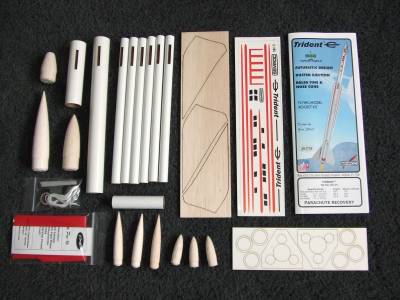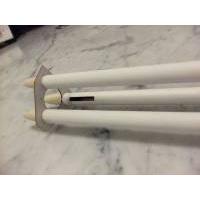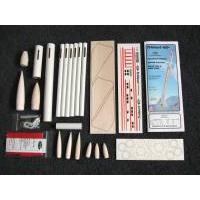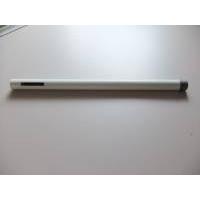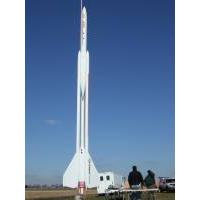| Construction Rating: | starstarstarstarstar |
| Flight Rating: | starstarstarstarstar |
| Overall Rating: | starstarstarstarstar |
| Published: | 2011-12-14 |
| Diameter: | 1.00 inches |
| Length: | 31.20 inches |
| Manufacturer: | Semroc  |
| Skill Level: | 1 |
| Style: | Futuristic/Exotic |
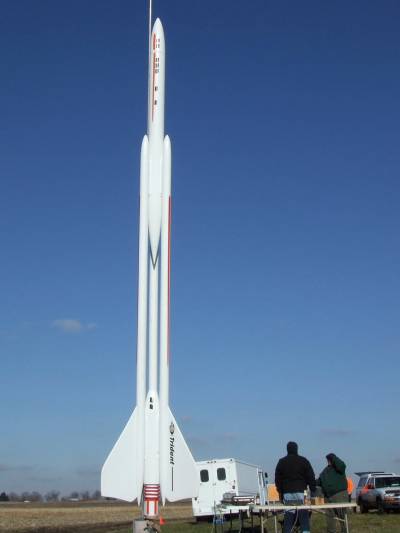 Brief
Brief
This is a retro-repro (modern day reproduction and enhancement of a classic kit) from Semroc. The original Astron Trident was introduced by Estes in 1968 and was a Gene Street design. It introduced a ducted ejection system that eliminated the need for recovery wadding, and was an instant favorite due to its sleek, futuristic styling. It's been a favorite clone candidate for many years, though the complexity of cutting all the slots for the ducts, plus the cost (9 balsa nose cones bought on the aftermarket don't come cheap!) could deter all but the most devoted cloners. Thanks to Semroc's offering, though, the construction is greatly simplified and the $44 retail price is not unreasonable, especially after factoring in typical discounts such as the 10% NAR member savings.
Components
Don't be fooled by the small bag--this kit includes a lot of parts, and the quality of each are excellent. The contents included:
- Balsa nose cones (9 total, 5 different sizes/styles)
- Pre-slotted body tubes (8)
- Laser-cut balsa fins (3)
- 18mm motor tube, metal hook, motor block
- 16" plastic chute
- Elastic shock cord
- Laser-cut centering rings, alignment jigs
- Waterslide decals
Construction
The instructions are very good, easy to follow and well illustrated. Construction basically spans 4 8.5x11 pages, 33 steps, and while it might be slightly more challenging than the skill level 1 rating, I don't think it's much tougher than a 1.5. Other than surface prep and finishing, I barely had an hour into the construction.
The motor tube is pre-slotted, though needs to be marked at 5 spots for decorative centering rings. After fitting the metal hook into the slot, slide each of the 5 rings (plus a 6th for forward alignment) into place. I recommend just a drop of super thin CA on each, except for wood glue fillets on the forward ring. You really don't want glue smears and fillets around the aftmost 4-5 rings, or the finished appearance will suffer. They're only there as eye candy, not to hold anything in place.
Next comes a series of modular assemblies. Each are very easy, but you need to be careful to select the right tube(s) and right cone(s). The main aft tube gets the shortest "fat" tube and the shortest nose cone. One tip for longevity--coat the aft end of the shoulder with a generous smearing of glue or epoxy, as it will catch a lot of ejection charges over time. Next come the three pod tubes. These assemblies consist of a pair of 9.5" slotted BT-5's joined via coupler, and a nose cone on each end (longer aft, shorter forward). To make sure the slots are perfectly aligned, you need to draw a line extending the slot edge up to the end of the tube. Either extend lines up for each edge, or just one side but be careful to extend "top" on half the tubes and "bottom" on the other half or your slots will be positioned adjacent to each other rather than perfectly aligned (see photo). The main forward tube gets a nose cone glued into the aft end, with a screw eye attached to the shock cord (do this before gluing it in...). The forward nose cone deploys, so is not glue in.
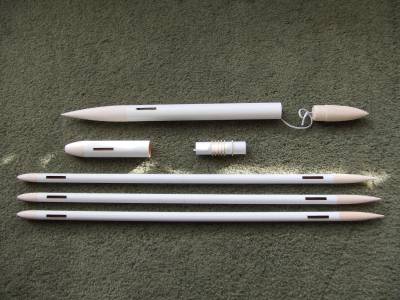
Now for gluing together all the assemblies. With the original, this was a lot of fun. You'd need to carefully position two tubes against each other with slots aligned, and apply a series of fillets to hold everything together and seal the gaps between the slots. Semroc provides a laser-cut jig.
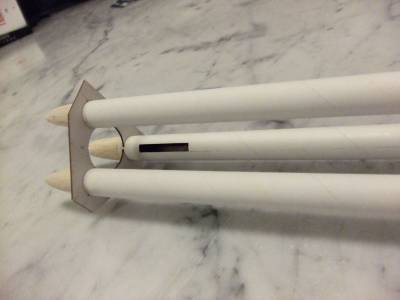
With this approach, you simply slide each of the BT-5 pods in, rotate them until the slots line up with a mark on the jig, then slide in the main for and aft tubes. Rotate the main tubes so that the slots line up with those of the BT-5's, and you're all set to glue. I used a bead of wood glue for the first bonding of each, then followed up with a fillet of 20-minute epoxy, but wood glue would certainly work fine. I just wanted the strength of the epoxy, plus could lay a heavier fillet that sets smoothly, versus 2-3 more rounds of wood glue that would tend to shrink and bubble a bit.
Once the tubes are glued up, while still in the fixture mark the launch lug and fin line locations on the fore and aft main tubes (based on a notch line on the fixture). Then, remove the assembly and tack on the fins and lugs.
That's all there is to construction. Old timers and cloners will never believe how much more easily this version builds than the original...
Finishing
Finishing on this turns out to be fairly simple as well. If you're into trying to eliminate spirals and grains, you'd better address that during construction, because some of the nooks and crannies will be darned near impossible to sand once assembled. I went with a simple finish of two coats of white primer, sanding lightly after each coat, followed by two coats of gloss white. I hand painted the aft rings red.
The Semroc kit includes nice waterslide decals, including for some reason and extra stripe decal for one of the long body tubes.The only slightly tricky part of decal application turned out to be the stripe and window decal running from the forward body tube and up onto the nose cone. I applied the decal, then after it had dried overnight I took a fresh/sharp blade along the cone/tube seam to slice the decal. I then applied a coat of Microscale decal setting solution to make sure the edges of the decal stayed on.
Flight
I loaded up a C6-5 for the first flight. With the ducted ejection, you really don't need wadding but I slipped in a bit of dog barf as insurance. Winds were light at ground level (5 mph) but picking up sharply above the nearby tree line, making for some interesting flights all day. The Trident, though, shot up straight as an arrow, only a couple rotations marring an otherwise perfect ascent. Deployment was just past apogee.
I went for a second flight right away, another C6-5. This one was a bit more wobbly when it hit the upper air currents, but was a fine flight as well.
Recovery
The Trident comes with a fairly generous 16" plastic parachute. Semroc's larger chutes, in particular, are built rugged with high tack adhesive pieces and a Kevlar reinforcement under each anchor. This is a chute that will hold up well. It also holds the model up well, resulting in a gentle descent. In my case, I could probably have benefited from a smaller chute, as this drifted a couple hundred yards, and once on the ground the chute occasionally puffed back up, dragging it even further away. Still, other than one small scrape of a decal, the rocket survived fine.
One thing that does tend to be a nuisance with the ducted ejection is the accumulation of particles in the inside tubes. After each flight, I recommend a good shaking to get as much of this out as possible.
Summary
This is just a great kit. Fantastic looks, flies great, and much easier to build than the original. Semroc's really got a winner here!
Sponsored Ads
 |
 |
